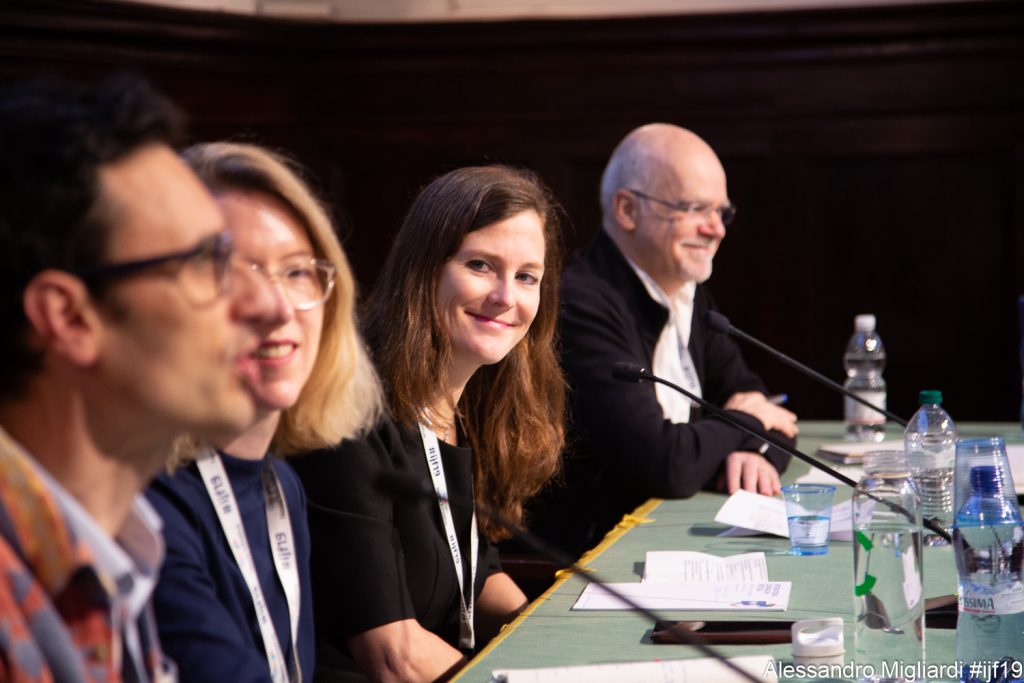Stay up to date by subscribing to our Newsletter or by following our Telegram channel, and join the conversation on Facebook, Twitter, and Instagram.
Edited by Marco Nurra
Watch all #ijf19 sessions on-demand: media.journalismfestival.com
Just say ‘racist’. This week the President of the United States “fanned the flames of a racial fire.” According to a panoply of major news outlets, Trump “starkly injected” “racially infused” and “racially charged” words into a morning tweetstorm; the language he used was “widely established as a racist trope” and “usually considered an ugly racist taunt.” The remarks were “called racist and xenophobic”; “denounced as racist”; an “example of ‘racism’” (note the quote marks). What had Trump said to necessitate such pained lexical contortion? He’d told a group of left-wing Democratic Congresswomen to “go back” to “the totally broken and crime infested places they came from.” Of the lawmakers Trump appeared to be targeting, all bar one—Ilhan Omar—were born in America. Irrespective of that context, Trump’s attack wasn’t racially charged; it was just racist, by any useful definition of the term. Why didn’t our media say so?
Maybe the origins of nightmarish online culture aren’t only in those dark corners — maybe they’re also in the kind of good ‘Internet culture’, the kind that people sometimes get nostalgic about. Whitney Phillips has a new paper out in Social Media + Society.
A new study shows moderating uncivil comments reduces the moderator’s trust in news. A new study from the Center for Media Engagement shows that people moderating uncivil comments on news sites decreases their trust in the news outlet and increases their emotional exhaustion. “The toll of moderating uncivil comments may be much stronger for moderators putting in several hours or a full day,”
Craigslist’s Craig Newmark: ‘Outrage is profitable. Most online outrage is faked for profit’. The founder of the online classifieds site is a survivor from the era of internet optimism. He has given significant sums to protect the future of news – and rejects the idea his website helped cause journalism’s financial crisis. Craig Newmark was a #ijf19 speaker:
🎥 Is philanthropy the answer to save journalism? – #ijf19 on-demand
— journalism festival (@journalismfest) July 15, 2019
with @Indira_L, @craignewmark, @arusbridger, @vivian https://t.co/5rSJwwBxKC
L’ucraino Vitaly Markiv condannato a 24 anni per l’omicidio del fotoreporter Andrea Rocchelli. Il verdetto della corte d’Assise riconosce la responsabilità di Markiv, il soldato 30enne della Guardia Nazionale Ucraina, nell’agguato nel Donbass in cui persero la vita Rocchelli e il giornalista russo Andrej Mironov. Andy Rocchelli non aveva ancora compiuto 31 anni quando venne ucciso dai mortai nei pressi di Sloviansk durante un lungo bombardamento mirato. In quello stesso attacco contro giornalisti inermi fu ferito Willliam Roguelon e colpito a morte l’attivista per i diritti umani Andrey Mironov, con il quale Rocchelli stava lavorando per documentare la situazione dei civili intrappolati nel conflitto russo-ucraino.
Il talento e il coraggio di un fotogiornalista. Storia di Andy Rocchelli – #ijf17 on-demand
— journalism festival (@journalismfest) July 16, 2019
con Elisa Signori, Rino Rocchelli, @williamroguelon, @BeppeGiulietti https://t.co/8EFlHmM3Bp
Come raccontare collettivamente una storia attraverso le fotografie – #ijf14 on-demand
— journalism festival (@journalismfest) July 16, 2019
con Andy Rocchelli, Michele Borzoni, Edoardo Delille, Rocco Rorandelli https://t.co/ypTPR9q8TG
Three formally charged in Malta for murder of Daphne Caruana Galizia. Three men have been formally charged over the 2017 murder of Daphne Caruana Galizia, a Maltese anti-corruption journalist and blogger who was killed by a car bomb in November 2017. Brothers Alfred and George Degiorgio, and Vincent Muscat, all in their fifties, were arrested in December of that year. The justice ministry’s confirmation of the charges, which allows a trial to be held, came on Tuesday just days before a 20-month deadline. The public prosecutor has a further 20 months to set a date for the trial, which legal experts say may not take place for years. Matthew Caruana Galizia was a #ijf19 speaker:
🎥 Fighting back: #ijf19talk by @mcaruanagalizia – #ijf19 on-demand https://t.co/cU9PW8JEP5
— journalism festival (@journalismfest) May 28, 2019
(Moderated by @mariocalabresi) pic.twitter.com/RVJEAH1Imy
A journalist returned to Somalia to tell positive stories—then terrorists killed her. The 43-year-old, whose family moved to Canada when she was six, decided to permanently move back herself to Somalia last year to counter stereotypical media coverage and showcase the country’s rich culture and natural beauty.
Turkish journalists acquitted of terrorist propaganda charges. Erol Onderoglu, the national representative for Reporters Without Borders, was one of three facing 14 years in jail. 140 journalists are currently in prison in Turkey, despite international demands that they be set free.
BBC accepts Iran’s demand for blackout on its Persian sites amid regime’s attacks on press. A deal to not share reporting from Iran on BBC Persian has angered staffers who see it as complicity with a government that imprisons, tortures and kills journalists.
The Australian Federal Police wanted the fingerprints of two ABC journalists involved in a series of stories about special forces’ conduct in Afghanistan. “We shouldn’t see journalists in Australia treated like criminal suspects, and that’s what this looks like.”
Tools and tips for digging into Facebook from two investigative journalists. Josh Coe reached out to Brooke Williams, an award-winning investigative reporter and Associate Professor of the Practice of Computational Journalism at Boston University and Henk van Ess, lead investigator for Bellingcat, whose fact-checking work using social media has earned a large online following, to talk about how they use Facebook to dig for sources and information for their investigations.
Are paywalls saving newspapers? Newspapers with reputable brands and unique content are finding success behind paywalls. For most papers, however, the future is not so clear.
The International Journalism Festival #ijf19 On-Demand

Every week, one recommendation from the extensive programme of the last edition of the International Journalism Festival.
Today we are inviting you to watch “Another business model is possible“. Membership, subscription, patronage… hear from startups and media organizations alike how they are re-inventing the way money is being made in the journalism business.

